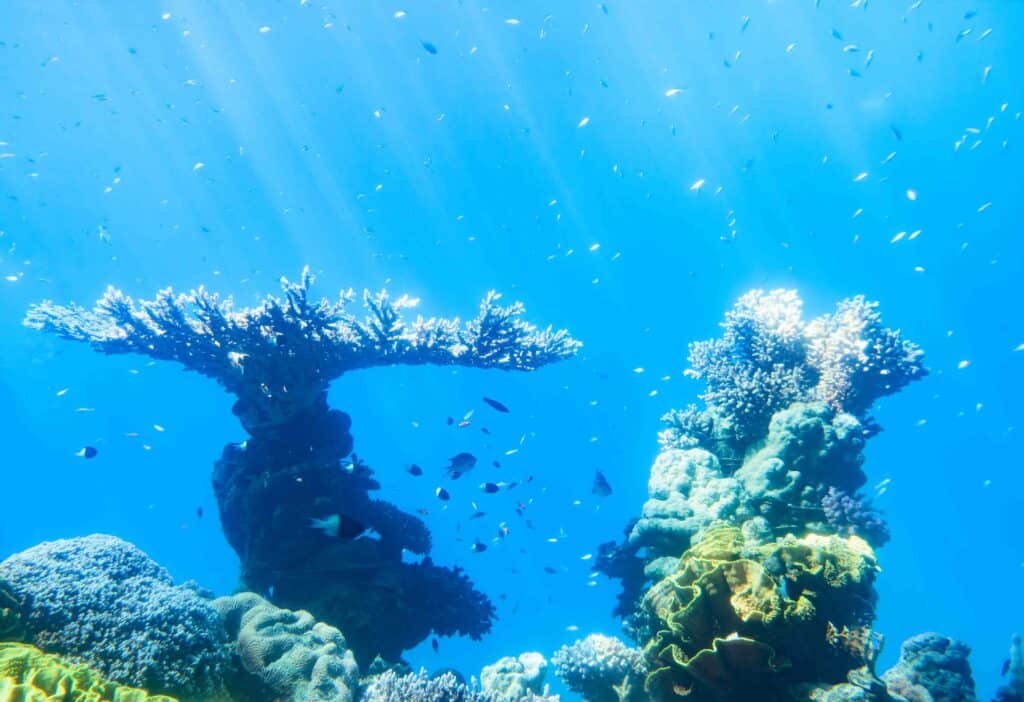June 8th is World Oceans Day. World Oceans Day celebrates our world's shared ocean and our personal connection to the sea and raises awareness about the oceans' critical role in our lives and the important ways people can help protect it. Even if you don’t live near an ocean, you can still do your part in protecting and restoring our oceans.

Consider these ocean facts:
- The ocean covers over 70% of the planet.
- It produces at least 50% of the planet’s oxygen.
- The ocean is home to most of the earth’s biodiversity and is the main source of protein for more than a billion people globally.
- The ocean is key to our economy, with an estimated 40 million people being employed by ocean-based industries by 2030.
- Oceans absorb about 30% of carbon dioxide produced by humans, buffering the impacts of global warming.
- Between 4-12 million metric tons of plastic enter the ocean each year, enough to cover every foot of coastline on the planet. That’s the equivalent of two garbage trucks of plastic dumped into our oceans each minute. Over the next 20 years, that amount is expected to triple.
- Plastic is forever. Plastic debris breaks down into ever-smaller particles, known as microplastics. Different forms of microplastics are present in almost all water systems in the world, including streams, rivers, lakes, and oceans.
- Over 1 million marine organisms are killed yearly due to ocean plastic pollution. Animals who eat plastic often starve because it prevents them from properly swallowing food.
- Today, 90% of big fish populations are depleted, and 50% of coral reefs are destroyed.
- By 2050 there will be more plastic in oceans, by weight, than fish.
Sea Hugger is a nonprofit focused on protecting and healing the marine environment from plastic pollution through action and education. Sea Hugger teaches people how to reduce plastic dependency while focusing on protecting the marine environment to ensure the intrinsic rights of aquatic life and help create sustainable communities that are no longer affected by plastic pollution.
Want to help make a difference? Sea Hugger offers 11 ways you can take action:
- Source Sustainably: Support local farmers, seasonal produce, and ocean-minded businesses to help strengthen a circular economy and healthy ocean.
- Recycle: Often, we place an item in the recycling bin with the hope that the item can be recycled when it can’t. Learning your local recycling guidelines helps save time, money, and effort for those working at the recycling centers.
- Connect with the Outdoors: Getting outside and in touch with nature helps lead to choices that protect our people and planet.
- Skip the Lid and Go Topless: To-go coffee cups are usually lined with a thin layer of plastic or are often plastic. Bring your own cup or skip the lid and go topless.
- Avoid Single-Use Plastics and Opt-Out of Plastic at the Grocery Store: Think twice about grabbing that produce bag or asking for plastic versus paper. Think of the resources, production, and 400-year lifecycle. Opt for a reusable bag or paper.
- Use Reusable Utensils: Use the utensils in your silverware drawer or invest in some great portable, reusable options.
- Switch to the Wood Cutting Board: Lose the plastic cutting board. When you cut on them, you create microplastics, which can get into your food. Consider a bamboo cutting board, and they are plastic-free and incredibly sustainable.
- Choose Sustainable Body Care: Choose plastic-free and reusable containers and think about the ingredients you might be washing down the drain.
- Lose the Flushable Wipes and Stay with the 3 P’s: All drains lead to the ocean. Flushable wipes typically don’t break down when flushed. Focus on the three things you can safely flush, pee, poo, and toilet paper.
- Bills, Bills, Bills: Think about switching to e-bills. You can save our ocean and planet a lot of resources. Think about what goes into the printing, including paper,
- Skip the Seafood: Give the ocean a break. If you want to fish, there are many well-managed and sustainable fisheries that support healthy oceans.
It’s not just people making a difference; many corporations are committed to sustainability and the environment. One company doing its part is Calgee, a sustainable vegan-certified Omega-3 supplements maker. The company is committed to people and the planet first and is a member of 1% for the Planet, pledging 1% of gross sales to Sea Hugger.
For companies like Calgee, it's more than donating money. The company has baked sustainability into every step of its manufacturing process. Beginning with single-sourced unblended DHA and EHA algae oil produced using a proprietary extraction method and grown in a controlled indoor environment with no added chemicals or toxins. This results in a minimal environmental footprint. The company also uses carbon-negative, plant-based, 100% recyclable packaging. Its recent packaging run generated a negative carbon footprint of 31 kg, equal to 604 party balloons worth of Co2. The packaging saves 240kg of petrochemical materials, a 70% reduction in reliance on virgin fossil fuel materials.
Today and every day, we can take simple actions to shrink our environmental footprint while retaining an ocean's worth of goodness.

Tell Us What You Think